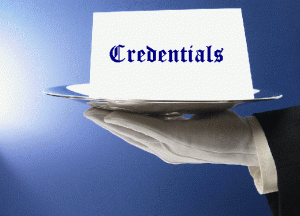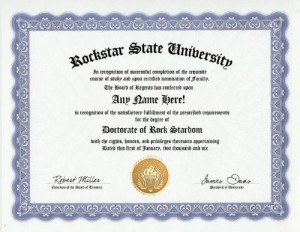To begin, here is what I am thinking as I write this post: Why did I not have the foresight to go first? The bar has been set way too high for me now and my only hope is not to lower it too dramatically with the following meager effort. This has been a phenomenal book study and online forum for discussing/reflecting on Khan’s insights. Thanks to all who have contributed!
In this very short chapter, Kahn suggests we are mixing three different ideas together when we speak of “education.” The first is the idea of teaching and learning. The second aspect is socialization. The third idea is that of credentialing–giving a piece of paper to someone that proves to the world that they know what they know. Khan maintains that these three ideas get muddled together because they are all performed by the same institutions and he makes the case for separating the role of ”credentialing,” letting people gain credentials through alternative sources.
Although short, I found this chapter both powerful and validating. Currently, traditional credentials for students are the diplomas they receive periodically. At the college level, these “credentials” are time consuming and expensive. Moreover, they are a bit vague in terms of describing what, exactly, the owner of the diploma actually knows and is able to do. What is truly important is not the diploma itself, but what the owner of the diploma can do as a result. I am reminded of the old Holiday Inn Express ad campaign in which various people perform remarkably in any number of roles with their only “qualification” being that they had stayed at a Holiday Inn Express the night before. Here is but one example:
How is this applicable to credentials? The fact that we have a diploma–or that we have stayed in a Holiday Inn Express–is really unimportant.What matters is whether we can perform the required skills. Personally, I have actually earned the “credential” of staying at a holiday Inn express. However, you wouldn’t want me performing surgery on you any time soon. As the commercials suggest, however, the reverse may be true. If you can perform the skills, the credential itself (a diploma) is subordinate in importance and can actually come from an alternative source of credentialing than the typical source (a school).

Traditional credentials also pose equity challenges for students from underrepresented communities. To make the process more affordable, fair, and less time consuming, what if we, instead, designed specific credential opportunities for a wide variety of skills and allowed anyone to attempt to earn these anytime and anywhere as a way to better themselves?
Like most things in education, what applies to students also applies to us, as educators. What if–instead of grad school–we were allowed to advance our pay level and degree level by proving we have acquired new knowledge and skills, instead of putting in the required seat time and credit hours to earn another diploma? Speaking only for myself and reflecting on my master’s, specialist’s, and doctoral degrees, I think such learning might have been more efficient, cost effective, and relevant than most of the traditional graduate-level education courses I endured.
I take pride in so much of what we have done and continue to do throughout our amazing school district. Among these many accomplishments is our own small initial foray into credentialing through our Deerfield University professional learning platform. I am hoping we can continue to explore additional ways to enhance teacher learning and growth by providing such credentialing opportunities. Moreover, it would be interesting to offer credentialing opportunities to our students as well. In fact, I wonder what credentials we would offer at various grade levels and subject areas? What would be the Top 5 credentials you would offer students the opportunity to earn if you teach 4th grade? Music? Art? PE? Kindergarten? Spanish? Maybe it would be fun to determine the “critical 5” for each area, knowledge and skills that you would expect any student in the grade/course to earn and another 5 that would be “growth” credentials, based on individual interest or exceptional aptitude in a certain area.
Khan labels this chapter, “The Future of Credentials,” but it seems as if too often in our noble profession we talk about “The future of…” when we need to shift our mindset and realize the future can be now. Identifying the key knowledge and skills we want our students and each other to possess, determining methods for measuring mastery of this, and then awarding a credential certifying such mastery are ways we can personalize learning for all today.

As we approach the end of both a calendar year and this collaborative book study and blog, I am reminded of how awesome Kipling School is and that Kipling is actually a model for much of what Khan champions in his work. This chapter is no different, as many Kipling teachers have led the way in personalizing their own learning–as well as the learning for their students–in the ways suggested by our pal, Sal. Sincere thanks to each and every Kipling staff member for serving as passionate educators who never seem to think that “good enough” is “good enough.” By the powers vested in me, I bestow upon each of you the credential of “Rock Star Educator.” Thanks for inspiring…and Rock On!
